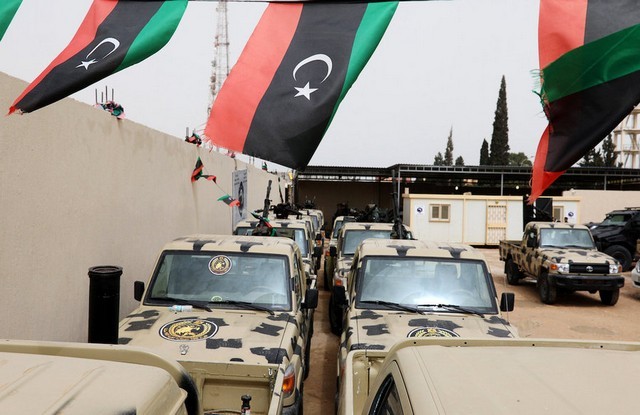By Rene Wadlow
With the administrative-political situation in Libya badly stalemated and a meeting for negotiations to be held 14-16 April unlikely to make progress, on Thursday 4 April 2019, General Khalifa Hafter, one of the key players in the drama decided to start a “March on Tripoli” and to take overall power by force.
Most of the significant buildings in Libyan cities were built by Italians during the Fascist period when Libya was an Italian colony. Thus, General Hafter has patterned himself on Mussolini’s 1922 “March on Rome”. In 1922, the diplomats of most States looked away when Mussolini marched or the diplomats took it as a domestic affair.
In 2019, the “March on Tripoli” has drawn more international attention and concern. The U.N. Secretary-General Antonio Guterres met with Hafter a few hours before the March began. Guterres was in Libya to facilitate the 14-16 April meeting on which his Special Representative Ghassan Salomé has been working for some time in the hope of drawing a road map for long-delayed elections. On Friday 5 April, the U.N. Security Council held a closed-door emergency meeting. The Security Council called for a halt to the March on Tripoli and the deescalation of the growing armed conflict.
The Security Council recognized the real possibilities of broader armed conflict and its consequences on the civilian population. In the recent past the Libyan armed factions have violated the laws of war and have a sad record of abuses against civilians.
We will now have to see if Khalifa Hafter is more open to international appeals than was Benito Mussolini. My impression is that the goal of holding overall power is stronger than the respect of international law. However, even a successful “March on Tripoli” will not create the conditions for an administration of a culturally and geographically-diverse country. New and appropriate constitutional structures must be developed.
There cannot be a return to the earlier Italian colonial structures, nor to the forms of government at independence developed by King Idris al Sanussi which depended largely on his role as a religious leader using religious orders, nor the complicated pattern of “direct democracy” developed by Muammar al Qadhafi. The Association of World Citizens has proposed the possibility of con-federal structures.
The post 2011 Libyan society faces large and complex issues. Resolving the institutional, economic and political issues is urgent and cannot be settled by elections alone. There are three distinct regions which must have some degree of autonomy: Tripolitania and Cyrenaica both bordering the Mediterranean and Fezzan in the southern Sahara. Within each of the three regions there are differing and often rival tribal societies which are in practice more kinship lines than organized tribes. (1) There are differing economic interests and there are differing ideologies ranging from “Arab Socialism” to the Islamist ideology of the Islamic State which has spread from its Syrian-Iraqi base.
The situation is critical, and the next few days may be crucial for the future of the country.
______________________________________________________________________________________________
Note
1) See J. Davis. Libyan Politics, Tribes and Revolution (London: I.B. Tauris, 1987)
______________________________________________________________________________________________
Rene Wadlow, President, Association of World Citizens
7 April 2019
Source: countercurrents.org

